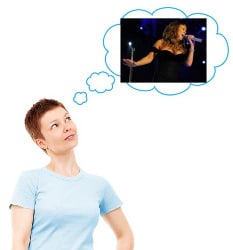“look forward to” is a very common expression in English but what does it mean exactly?
Meaning:
To think about something in the future with pleasure.
To be pleased or excited that something is going to happen.
Example:
I’m looking forward to the concert.

This means that I am excited about the concert that is taking place at some time in the future. I am thinking about it positively and with pleasure.
Let’s look at the form and grammar rules with some more examples.
Form
There are 3 common structures:
Structure 1 – with a noun phrase
Form:
look forward to + noun phrase
Examples:
Jane is looking forward to her birthday.

I’m looking forward to the weekend.
Mark is looking forward to the party.
Structure 2 – with a gerund
Form:
look forward to + gerund (ING form of verb)
A gerund is the ING form of a verb. It is a verb acting as a noun.
Examples:
Mark is looking forward to buying a house. ![]()

I’m looking forward to going to London. ![]()
I’m looking forward to meeting you. ![]()
We do not use the base form of the verb:
I’m looking forward to go to London. ![]()
Mark is looking forward to buy a house. ![]()
I’m looking forward to meet you. ![]()
Structure 3 – a verb with a different subject
If the second verb has a different subject, we use the object pronoun. We do not use the subject pronoun.
Form:
look forward to + object pronoun + gerund
Example:
I’m looking forward to him visiting me next week. ![]()
Meaning: Mark is visiting me next week. I’m excited about it.
Remember, we do not use the subject pronoun as the subject of the second verb:
I’m looking forward to he visiting me next week. ![]()
Common in written English
“look forward to” is very common in written English, particularly in business English.
We often use it at the end of a letter or email. In this context, the meaning is not that we are excited about something. It’s a polite way of asking someone to do something. It is a way of telling someone that we are expecting them to do something for us.
We use the present simple form.
Examples:

We look forward to receiving the contract.
(A polite way of saying “Send us the contract.”)
I look forward to your reply.
(A polite way of saying “Make sure you reply to this message.”)
I look forward to hearing from you soon.
(Another polite way of saying “Make sure you reply to this message.”)
More English lessons
English lessons on our Youtube channel
Subject and object pronouns
The ING form of English verbs
English idioms and expressions about feeling sad
IELTS speaking advice

